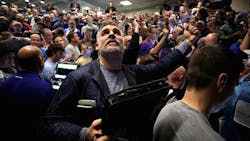Fed Raises Interest Rate for First Time in Nearly a Decade
WASHINGTON—The Federal Reserve announced Wednesday its first interest rate increase in more than nine years in a landmark move signaling the United States has finally moved beyond the 2008 crisis.
The move, which has repercussions across the global financial system, also imprinted Janet Yellen's personal stamp on U.S. monetary policy after nearly two years as Fed chair spent plotting to reverse course from the easy-money stance bequeathed by predecessor Ben Bernanke.
The Fed raised its benchmark federal funds rate, locked near zero since the financial crisis, by a quarter point to 0.25-0.50%, saying the world's biggest economy is growing solidly and should accelerate next year to a respectable 2.4% pace.
"This action marks the end of an extraordinary seven-year period during which the federal funds rate was held near zero to support the recovery of the economy from the worst financial crisis and recession since the Great Depression," Yellen said.
"It also recognizes the considerable progress that has been made toward restoring jobs, raising incomes, and easing the economic hardship of millions of Americans."
The move was widely expected and marked the end of an era in which the Fed pumped trillions of cheap dollars into the devastated U.S. economy to fuel what turned out to be an unexpectedly long rebound.
It kicks off a likely series of rate increases which the Federal Open Market Committee, the Fed's policy board, promised would be "gradual" and follow the pace of the economy.
FOMC projections showed they expect the rate will rise to about 1.4% by the end of 2016, suggesting four more increases over the coming 12 months.
"The important question is how far, how fast," said economist Edwin Truman at the Peterson Institute for International Economics.
Markets React Positively
The announcement, and the Fed's positive outlook for U.S. growth, pushed Asian and U.S. stocks higher, with the S&P 500 finishing with a 1.5% gain, most of which came after the Fed's announcement.
Stocks in Australia, Tokyo and Hong Kong were all up, and the dollar rose slightly against the euro.
The rate increase came amid some criticism from prominent economists that the economy was still vulnerable to slower global growth and that there was no compelling reason-- like surging inflation and a tight jobs market--to justify it.
But FOMC support for the decision was unanimous. The committee pointed to "considerable" improvement in the labor market and said it is "reasonably confident" in inflation rising over the medium term, to its two percent objective.
"The first thing that Americans should realize is that the Fed's decision today reflects our confidence in the U.S. economy," Yellen told a press conference.
"While things may be uneven across regions of the country, and different industrial sectors, we see an economy that is on a path of sustainable improvement."
Yellen predicted the challenges of ultra-low inflation and continued slack in the labor market would both diminish significantly over the coming year.
"What we would like to avoid is a situation where we have waited so long that we are forced to tighten policy abruptly, which risks aborting what I would like to see as a very long-running and sustainable expansion," she explained.
'Source of Strength'
Analysts said the immediate policy change was only modest and were focused on how the Fed will move in the next year.
The prospect of more increases of the Fed's rate will have a broad impact on the global financial system.
It means a higher cost of borrowing for everyone from foreign governments and companies to home and car buyers, while also better rewarding savers on their bank accounts.
The Fed argues that U.S. businesses can continue to invest and hire with a modestly tighter dollar policy.
As for foreign economies, especially emerging markets that have already seen capital outflows and falling currencies due to the expected shift by the Fed, Yellen says they had been forewarned and are in better shape than in the crises of the 1990s.
"This action takes place in the context of a US economy that is doing well, and is a source of strength to the emerging markets and other economies around the globe," she said.
Kathy Lien of BK Asset Management noted that "the most important monetary policy event of the year proved to be a dud for market volatility.
"This muted reaction to a historic change in monetary policy is exactly what the Federal Reserve likes to see and despite all of their critics, we see this as a credit to their proper management of market expectations."
Copyright Agence France-Presse, 2015
About the Author
Agence France-Presse
Copyright Agence France-Presse, 2002-2025. AFP text, photos, graphics and logos shall not be reproduced, published, broadcast, rewritten for broadcast or publication or redistributed directly or indirectly in any medium. AFP shall not be held liable for any delays, inaccuracies, errors or omissions in any AFP content, or for any actions taken in consequence.
